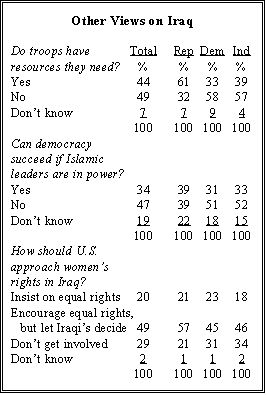|
Pew Research: Dems take double digit lead
in mid term elections
Pew Research Center September 15, 2005 Summary of Findings
As was the case in the spring, Americans are largely critical of the overall performance of both major parties. But the Republicans face greater political dangers. In an early test of strength on next year's midterm elections, Republicans trail by 52%-40% among registered voters. Equally important, Democrats are favored on most major issues. Even on terrorism, which consistently has been a Republican strength, the GOP's advantage has narrowed.
The latest national survey by the Pew Research Center for the People & the Press of 1,523 Americans, conducted Sept. 8-11, finds that rising energy prices have affected American lifestyles in a variety of ways. Nearly three-in-ten (27%) report they have bought a car that gets better gas mileage. And with winter three months off, 64% of Americans say they are adjusting their home thermostats to reduce energy bills.
Yet the public also overwhelmingly supports government efforts to require better fuel efficiency from cars, trucks and SUVs. Fully 86% favor the government requiring improved efficiency; there is virtually no partisan difference on this issue. Sizable but smaller majorities back several other possible policies to address the energy situation, including price controls on fuel and energy (69%). But despite growing concern over energy supplies and prices, most Americans oppose the government promoting the increased use of nuclear power.
Economic Perceptions More Americans hold a pessimistic outlook on the nation's economic prospects than at any time during Bush's presidency. By two-to-one (37%-18%), more believe the economy will be in worse shape a year from now than believe things will improve. In August 2004, just 9% said they expected the economy to worsen over the succeeding 12 months. That number doubled to 18% in January, and has doubled again (to 37%).
About three-in-ten (31%) rate economic conditions as good or excellent, while about twice as many view things as only fair or poor (68%). Opinion was similar in May (32% good/excellent, 67% only fair/poor). Since January, pessimism about the direction of America's economy has increased across the political spectrum, but has grown most among political independents. In January, somewhat more independents said the economy would get better over the following year than said it would get worse (24% vs. 17%). In the current survey, more than three times as many independents expect economic conditions to worsen over the next year as expect them to improve (42% vs. 12%). This generally negative outlook exists across the economic spectrum. Among both wealthy and poor, more see the economy over the next year getting worse, not better, by a margin of roughly two-to-one.
The Democratic Party is widely seen as the party better able to handle a wide range of policy issues. In addition to favoring the Democratic Party on its traditional strengths such as reforming the health care system and protecting the environment, pluralities today also pick the Democrats to handle energy problems, Social Security, and education. On the important issues of the economy and Iraq, the public is more divided, with the Democrats holding only a slight edge. And on the issue of ensuring that the government can handle major disasters, 40% favor the Democrats, while 34% choose the Republicans.
Democrats Dissatisfied with Party Leadership Despite their issue advantages, Democratic leaders in Congress receive only a 36% job approval rating overall, the same rating given to their GOP counterparts. The low mark for Democratic leaders reflects significant dissatisfaction among their own partisans. Just 49% of Democrats approve of the job their leaders are doing in Congress, down from 64% in May. By comparison, 72% of Republicans approve of the job their congressional leaders are doing. Independents, on balance, disapprove of both parties' congressional leadership. Democrats have expressed a good deal of dissatisfaction with the direction of their party in Washington since George W. Bush took office, but this sentiment has become particularly widespread since the 2004 election. Currently, 63% of Democrats and Democratic-leaning independents say the party is doing only a fair or a poor job standing up for its traditional positions on such things as protecting the interests of minorities, helping the poor and needy, and representing working people. Barely a third give the party excellent (3%) or good (32%) marks. While less critical than the Democrats, Republicans, too, have become increasingly disillusioned with the job their party is doing standing up for its traditional positions on such things as reducing the size of government, cutting taxes and promoting conservative social values. The percentage of Republicans and Republican-leaning independents who rate the party favorably has fallen from 61% just over a year ago to 48% today. This is the lowest level of GOP satisfaction on this question since before Bush took office.
Overall, most registered voters (57%) say they would like to see their representative in Congress reelected in 2006, while 25% say they want their representative replaced. At the same time, only 36% say they want to see most members return for another term, while nearly half (48%) want to see most members of Congress voted out next year. The latter is among the highest levels of dissatisfaction with Congress measured by the Pew Research Center in the last decade, exceeded only by pre-election polls in 1994 when clear majorities wanted most members to lose their jobs.
A solid majority of Americans (57%) rate developing new energy sources as a higher priority than protecting the environment. That represents a modest change from recent years, when slightly fewer than half viewed developing energy sources as a greater priority. There has been a comparable shift in views on whether it is more important to expand energy exploration or increase conservation. Opinion tilts slightly in favor of conservation (by 48%-43%), but by a smaller margin than in 2002. Young people, in particular, now view developing new energy sources as a more important priority than protecting the environment. Currently, 58% of those ages 18-29 say developing new energy sources is a more important priority than protecting the environment; in March, a narrow majority of young people rated environmental protection as the more important priority. Similarly, 63% of college graduates now view energy development as a more important priority than environmental protection; in March, 50% expressed that view. On a related issue, most Americans (52%) say trying to find new energy supplies should take precedence over controlling rising gas prices and dealing with current energy shortages. But somewhat more rate controlling prices as a higher priority than did so in May 2001, when there was also intense focus on energy (36% now vs. 31% then).
When the public is asked who is most to blame for rising gas prices, a plurality (36%) points to major oil companies. More than a quarter (27%) say the president or his administration is most to blame for the price hike. OPEC and other foreign oil producers also get a share of the blame (18%). About one-in-ten (9%) blame Hurricane Katrina, while about as many (8%) blame people who own SUVs and other low gas mileage vehicles. In another sign of public skepticism toward major oil companies, 73% of Americans say that the current high price of gas is the result of companies taking advantage of the situation, rather than because of real shortages in the oil supply.
Roughly half of Americans (48%) say that, if the U.S. is to become less dependent on oil, it is very important for people now driving SUVs to switch to more fuel-efficient vehicles. That is slightly more than the number expressing that opinion in a November 2001 poll by Newsweek (42%).
Overall, about three-in-ten Americans (27%) say that, in dealing with higher energy costs, they have bought a car that gets better gas mileage. Interestingly, there are only modest demographic differences on this measure, although Americans ages 65 and older are somewhat less likely than younger people to have done this. There are bigger differences among political groups, however. About four-in-ten liberal Democrats (39%) say they have bought a car that gets better gas mileage, the highest proportion in any political/ideological group.
Despite a long summer with continued casualties, and a widely covered anti-war protest outside the president's vacation ranch, public attitudes on the war in Iraq are remarkable for their overall stability. Most continue to see the military effort in Iraq going either very (12%) or fairly (41%) well, and the proportion that says taking military action there was the right decision has held steady at 49%, while 44% think it was the wrong decision. A slim 51% majority believes the U.S. should keep military troops in Iraq until the situation has stabilized, while 45% want to bring troops home as soon as possible. An equal number believes that military action in Iraq has helped the war on terrorism as say it has hurt. This represents a slight improvement since July, but is consistent with most measures taken since mid-2004 that show the public divided on this question.
But public optimism about the long-term continues to wane, and support for setting a timetable for when U.S. troops will be withdrawn from Iraq has risen notably. The proportion of Americans who think the situation in Iraq is likely to turn out to be like Vietnam rose from 29% a year ago to 35% this June to 39% today. This shift has been most pronounced among independents and younger people. A year ago, just 29% of independents saw Iraq turning into another Vietnam; today, a 46% plurality expresses this view. And the number of Americans under age 30 who foresee Iraq becoming another Vietnam has doubled from 22% to 42% over the same time period.
The idea of a timetable has opened up a rare fissure among typically unified Republicans. Currently, a 58% majority of moderate and liberal Republicans say the U.S. should set a timetable for when troops will be withdrawn from Iraq, up from 36% two months ago. By comparison, a 58% majority of conservative Republicans oppose the idea of setting such a timetable.
By two-to-one (63% to 30%), most Americans believe George W. Bush does not have a clear plan for bringing the situation in Iraq to a successful conclusion but even fewer believe that Democratic leaders in Congress are providing a clear alternative. Just 18% say Democrats have a clear alternative for how to deal with the situation in Iraq, while 71% say they do not. While Bush rates better than Democrats, this is due to his strong backing among Republicans. Most independents are skeptical about the strategy offered by both Bush and the Democrats. Just 19% of independents say Bush has a clear plan for how to succeed, and only 16% say Democratic leaders in Congress have a clear alternative for how to deal with the situation. Nearly two-thirds of Republicans (64%) express confidence in Bush's plan, while barely a quarter of Democrats (26%) believe Democratic leaders have a clear alternative. Divided Views on Troop Resources Nearly half of Americans (49%) believe that U.S. troops in Iraq do not have the resources and equipment they need to fight the war effectively, while 44% say that they do. Not surprisingly, there is a wide partisan divide on the issue, with most Republicans expressing the view that supplies are adequate, and Democrats and independents agreeing that they are not.
There are widely disparate views on how America should approach the issue of women's rights in Iraq as the government there establishes its constitution and laws. One-in-five say the U.S. should insist that a new Iraqi government provide equal rights for women, while 29% believe we should not get involved in the issue at all. The more accepted option is a middle position that the U.S. should encourage equal rights for women but leave it up to the Iraqis to decide. Interestingly, there is no gender gap on this question men and women express nearly identical positions. Pluralities of Democrats and independents and a solid majority of Republicans feel the U.S. should encourage equal rights for women, but let the Iraqis decide the issue. But Democrats and independents are more likely than Republicans to say that the U.S. shouldn't get involved. Commentary: There's an old rule in politics and it goes something like this; "When the opposition is destroying itself, get out of the way." Dems can safely remain silent on many issues, but they shouldn't help Bush by passing Roberts. |
|
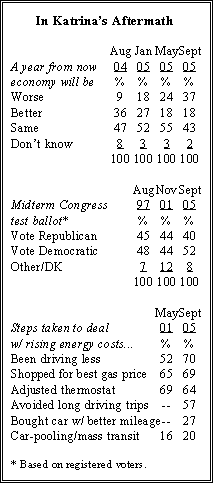 A summer's worth of bad news, culminating with
Hurricane Katrina, has taken a toll on the public's mood, particularly when it
comes to views of the economy and energy costs. The public's economic
expectations, while hardly robust in the spring, have grown much more negative.
Nearly four-in-ten (37%) think economic conditions will be worse a year from
now, up from 24% in May and 18% in January. At the same time, higher energy
prices are now having a major impact on Americans' daily lives, with 70% saying
they are driving less to save money on gas.
A summer's worth of bad news, culminating with
Hurricane Katrina, has taken a toll on the public's mood, particularly when it
comes to views of the economy and energy costs. The public's economic
expectations, while hardly robust in the spring, have grown much more negative.
Nearly four-in-ten (37%) think economic conditions will be worse a year from
now, up from 24% in May and 18% in January. At the same time, higher energy
prices are now having a major impact on Americans' daily lives, with 70% saying
they are driving less to save money on gas.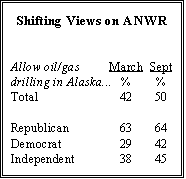 Public support for the U.S. military effort in Iraq has held
steady through the summer, despite ongoing violence in that country. Roughly
half of Americans (51%) continue to support maintaining U.S. troops in Iraq
until the situation there has stabilized. However, there is growing sentiment
in favor of setting a timetable for withdrawing the troops 57% favor that
step now, up from 49% in July. Moreover, a steadily growing number of Americans
feel Iraq will turn out to be another Vietnam. About four-in-ten (39%) express
this view, compared with 29% a year ago.
Public support for the U.S. military effort in Iraq has held
steady through the summer, despite ongoing violence in that country. Roughly
half of Americans (51%) continue to support maintaining U.S. troops in Iraq
until the situation there has stabilized. However, there is growing sentiment
in favor of setting a timetable for withdrawing the troops 57% favor that
step now, up from 49% in July. Moreover, a steadily growing number of Americans
feel Iraq will turn out to be another Vietnam. About four-in-ten (39%) express
this view, compared with 29% a year ago.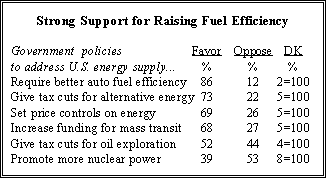
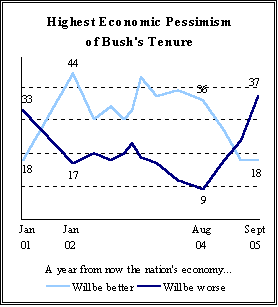 For the most part, the public blames energy producers for rising
gas prices, but many also fault the president. More than a third (36%) blame
major oil companies, while 27% point to President Bush and his administration.
About one-in-five (18%) blame OPEC, Middle Eastern countries, and other foreign
oil producers. Just 36% express confidence that the president is taking the
right approach to solving the nation's energy problems. Bush's overall job
approval rating stands at 40%, unchanged since last week (Sept. 6-7).
For the most part, the public blames energy producers for rising
gas prices, but many also fault the president. More than a third (36%) blame
major oil companies, while 27% point to President Bush and his administration.
About one-in-five (18%) blame OPEC, Middle Eastern countries, and other foreign
oil producers. Just 36% express confidence that the president is taking the
right approach to solving the nation's energy problems. Bush's overall job
approval rating stands at 40%, unchanged since last week (Sept. 6-7).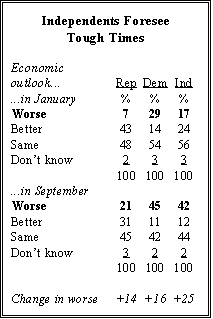 The public's assessments of current economic conditions, while
negative, have not declined since May.
The public's assessments of current economic conditions, while
negative, have not declined since May.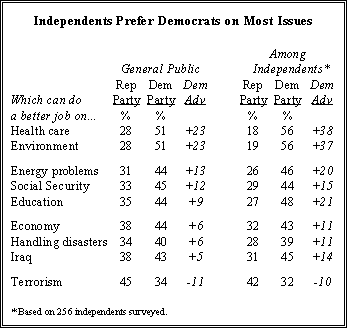
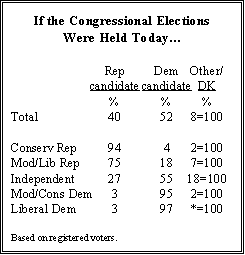 The single issue that still works to the Republican Party's
advantage is dealing with the terrorist threat at home 45% say the
Republicans can do a better job on this, while 34% choose the Democrats. But
even here, the GOP's edge has narrowed significantly as the Democrats have made
gains. In the lead-up to the 2002 midterm the Republican Party held a
two-to-one (44% vs. 22%) edge on this issue.
The single issue that still works to the Republican Party's
advantage is dealing with the terrorist threat at home 45% say the
Republicans can do a better job on this, while 34% choose the Democrats. But
even here, the GOP's edge has narrowed significantly as the Democrats have made
gains. In the lead-up to the 2002 midterm the Republican Party held a
two-to-one (44% vs. 22%) edge on this issue.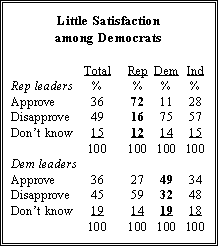 Much of the Democrats' overall issue advantage can be attributed
to the views of independents, who decidedly favor the Democratic Party's
leadership across nearly all issues. For example, the Democrats' narrow 44%-35%
edge on education overall reflects a more substantial 48%-27% advantage among
independents. Similarly, independents clearly favor the Democratic Party's
approach to dealing with energy problems, the economy, and the situation in
Iraq. And even more notably, when it comes to environmental and health care
issues, independents have more faith in the Democrats than the Republicans by
margins of roughly three-to-one.
Much of the Democrats' overall issue advantage can be attributed
to the views of independents, who decidedly favor the Democratic Party's
leadership across nearly all issues. For example, the Democrats' narrow 44%-35%
edge on education overall reflects a more substantial 48%-27% advantage among
independents. Similarly, independents clearly favor the Democratic Party's
approach to dealing with energy problems, the economy, and the situation in
Iraq. And even more notably, when it comes to environmental and health care
issues, independents have more faith in the Democrats than the Republicans by
margins of roughly three-to-one.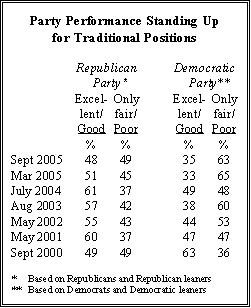 The Democrats currently hold a 12-point advantage in the
congressional horserace. While most partisans say they plan to stick with their
party's candidate, independent voters currently lean Democratic by two-to-one
(55% to 27%).
The Democrats currently hold a 12-point advantage in the
congressional horserace. While most partisans say they plan to stick with their
party's candidate, independent voters currently lean Democratic by two-to-one
(55% to 27%).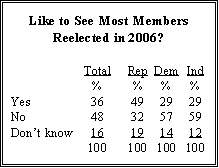 Fallout for Incumbents
Fallout for Incumbents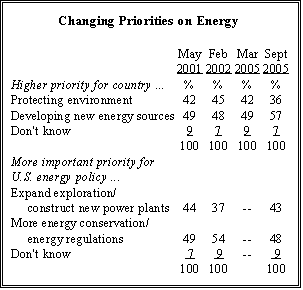
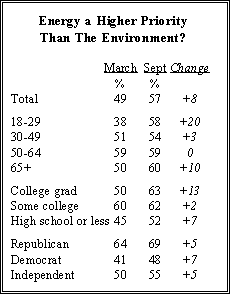 Energy vs. Environment
Energy vs. Environment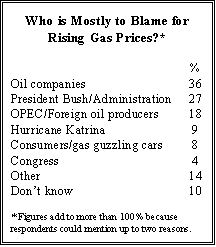 Who's to Blame?
Who's to Blame?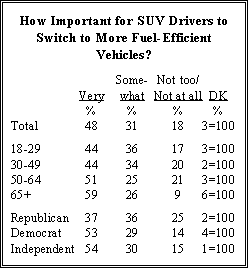 Fuel Efficiency: Principle and Practice
Fuel Efficiency: Principle and Practice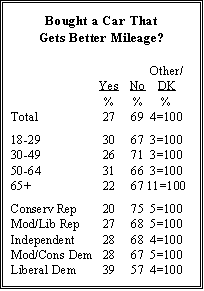 People ages 65 and older, in particular, feel it is very
important for SUV drivers to shift to vehicles with better gas mileage. Nearly
six-in-ten senior citizens say this, compared with about half of those ages
50-64 (51%) and fewer of those younger than 50 (44%). Democrats and
independents also are much more likely than Republicans to place great
importance on SUV drivers moving to more fuel-efficient vehicles.
People ages 65 and older, in particular, feel it is very
important for SUV drivers to shift to vehicles with better gas mileage. Nearly
six-in-ten senior citizens say this, compared with about half of those ages
50-64 (51%) and fewer of those younger than 50 (44%). Democrats and
independents also are much more likely than Republicans to place great
importance on SUV drivers moving to more fuel-efficient vehicles.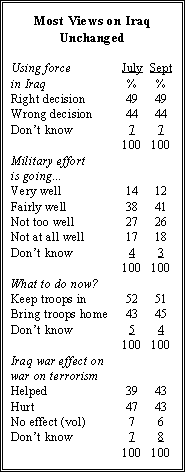 Core Iraq Attitudes Stable...
Core Iraq Attitudes Stable...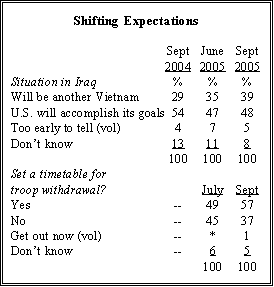 ...But Growing Call for Timetable
...But Growing Call for Timetable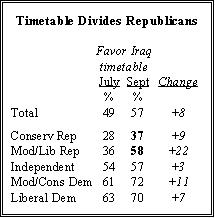 In this regard, the most notable shift in public opinion about
the situation in Iraq over the summer is increasing support for the idea of
setting a timetable for troop withdrawal, from 49% in July to 57% today.
In this regard, the most notable shift in public opinion about
the situation in Iraq over the summer is increasing support for the idea of
setting a timetable for troop withdrawal, from 49% in July to 57% today.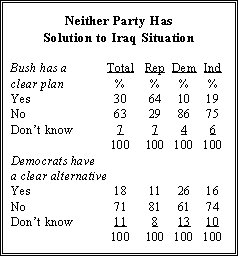 Bush and Democrats Faulted on Iraq
Bush and Democrats Faulted on Iraq